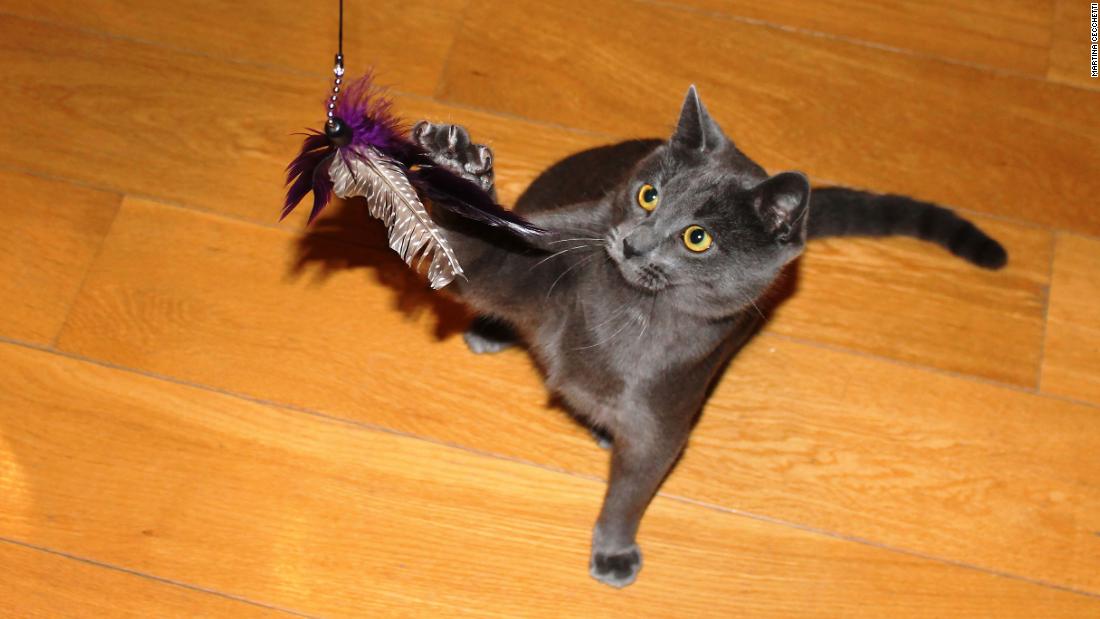Typical methods of preventing cat hunting, which raise concerns about conservation and well-being, are based on methods that many cat owners find unacceptable, such as keeping them indoors or making them wear special collars.
But now a team of researchers at the University of Exeter in southwest England has found that playing and dieting can have a significant effect, according to a university press release published on Thursday.
Feeding a cat premium commercial food, in which proteins come from meat, resulted in a 36% reduction in the number of prey brought home, while five to 10 minutes of daily play resulted in a 25% reduction, the researchers said .
“While keeping cats indoors is the only surefire way to avoid hunting, some owners are concerned about the welfare implications of restricting their cats’ outdoor access,” said Robbie McDonald, professor of ecology at the Institute Exeter’s Environment and Sustainability Committee.
“Our study shows that – using totally non-invasive and non-restrictive methods – owners can change what the cats themselves want to do.”
During the study, owners simulated hunting, allowing cats to chase, chase and launch themselves on a feather toy before giving them a toy rat after each “hunt,” the researchers said.
In the meantime, scientists don’t know exactly why fleshy food has reduced hunting, but they have a theory.
“Some cat foods contain proteins from plant sources like soy, and it is possible that, despite forming a ‘complete diet’, these foods leave some cats deficient in one or more micronutrients – leading them to hunt,” said Martina Cecchetti , a doctoral student at Exeter who conducted the experiments, in the press release.
Cats are known for their “unusual nutritional needs,” McDonald told CNN. “They are unusually lacking in some specific nutrients, some amino acids and so on, which are best supplied in meat.”
The study involved 355 cats from 219 families in southwest England and lasted 12 weeks.
The researchers also examined the effectiveness of colored collars that do not harm birds in reducing hunting, recording a 42% reduction in the number of birds captured and brought home. The layers did not affect the number of mammals hunted.
The cat’s bells also “had no noticeable overall effect,” the researchers said. However, the impact on individual cats varied widely, suggesting that certain cats can learn to hunt well, even using a bell.
Georgina Bradley of SongBird Survival, a bird protection charity that sponsored the research, welcomed the results.
“The data shows that cat owners (like me) can take some small, easy steps to really improve the health and happiness of our pets, as well as make a big difference for all of our wild animals, especially our loved ones. songbirds, “said Bradley.
Researchers will now try to identify what is in meat that reduces feline hunting, such as a specific amino acid, McDonald said.
This could allow a specific micronutrient to be added to cat food to reduce hunting without relying on meat production, which “raises clear climate and environmental issues,” said Cecchetti in a statement.
The team will also investigate whether the combination of a change in food with this particular game routine can produce a greater reduction in hunting, McDonald said.
“We suspect that the two things are acting in slightly different ways, if we like, in the cat’s behavior,” he said, explaining that this suggests that there would be an additive effect if the food and play were changed.
Another possible area of study is to increase the number of game sessions, or add a different type of game, he added.
The article was published in the journal Current Biology.
